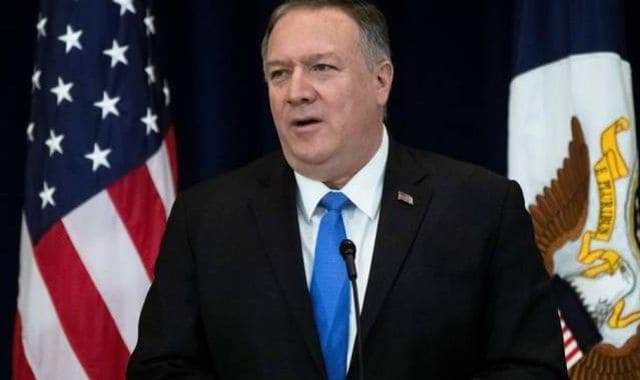Pompeo calls U.S. embassy attack "state sponsored terror"

Secretary of State Mike Pompeo called the Tuesday attack on the U.S. Embassy in Baghdad "state-sponsored terror" in an interview with CBS News. But he emphasized that the embassy is "safe" and that the U.S. "never contemplated" evacuating the facility.
"This is state-sponsored terror, this is Iranian-backed terrorism that took place," Pompeo told CBS News' Major Garrett in his first broadcast interview since the attack.
The interview comes after an estimated 6,000 protesters gathered at the embassy on Tuesday, raging against U.S. airstrikes earlier in the week that killed 25 fighters from an Iran-backed Shiite militia in Iraq. The U.S. strikes were an act of retaliation for the killing of an American contractor working at an Iraqi military base who died in a rocket attack last week.
The protesters yelled "Down, Down USA!," and several dozen managed to get into what a senior U.S. official described to CBS News as a reception area just outside the compound.
"The embassy is being monitored, it's safe," Pompeo said. "The actions that we took today were prudent ... Under President Trump's direction, our team worked together today to quickly, decisively, prudently take the responses to keep our American people safe."
When asked if the U.S. was caught off guard by the attack, Pompeo said, "We've known for a long time that there was this risk."
"It's been 40 years that the Islamic Republic of Iran has been at this and we've watched them continue to take actions, we saw them take actions that killed an American in Iraq just this past week," he added.
Garrett asked to what degree the Iraqi government let the U.S. down.
"So early this morning, I made clear when I spoke with the Iraqi leadership that the Iraqis had the responsibility to keep our facilities safe," Pompeo said. "They responded. They brought counterterrorism forces to bear. We reminded them throughout the day of their continued responsibility, and we told them where we thought there was risk."
"We'll make sure they continue to live up to their obligation to keep our facility safe," he added.
Pompeo also defended the airstrikes that militias cited as the cause of some of the protests. "The actions we took, now a couple days back, was in direct response to these same people — Kataeb Hezbollah — these same people who took actions against us and resulted in the loss of life of an American citizen," he said. "President Trump has made clear when that happens, we are going to respond. And we did."
Pompeo was also asked about North Korea, which recently announced that it would end its moratorium on nuclear and ballistic missile testing.
"I was more concerned about it when this administration took office," Pompeo said. "We were in a place where it was very likely that we would have ended up in a war with the Democratic People's Republic of North Korea. President Trump has taken an approach where we've tried to develop a diplomatic pathway. We hope that the North Koreans will reconsider, that they'll continue down that pathway. It's important, it's the right solution. We want peace, not confrontation."
"I was there when Chairman Kim made the commitment that said he would not engage in intercontinental ballistic missiles or test firing of their nuclear weapons, testing their nuclear weapons systems," Pompeo added. "He made those commitments to President Trump in exchange for President Trump agreeing not to conduct large-scale military exercises. We've lived up to our commitments. We continue to hold out hope that he'll live up to his as well."
Photo: https://newsvoice.com/i/4073506




